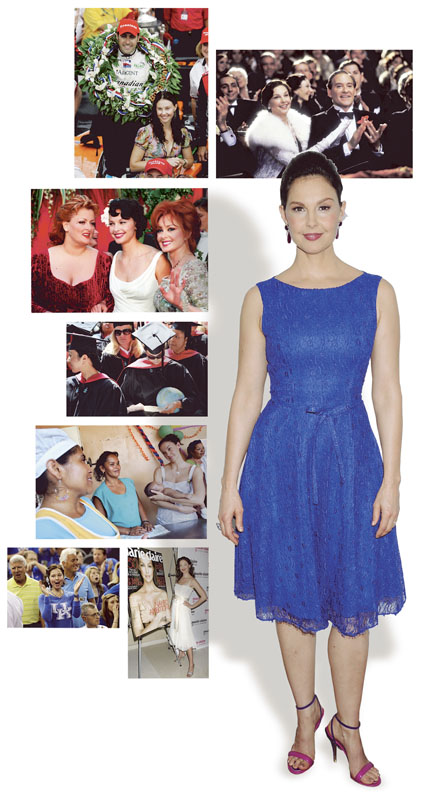“Do you find Ashley Judd’s face puffy?” I ask my husband during breakfast. He lowers the paper and looks at me as if I’ve just spoken to him in Burmese. He chooses his words carefully, as one might answer a CIA agent or cast member from “The Borgias.”
“Who is Ashley Judd and exactly what do you mean by ‘puffy’?”
If you’re not my husband, you probably know that film and television star — and political activist — Ashley Judd has recently spoken out about “the objectification of girls and women and this hypersexualization of our society that invites” criticism of women’s looks. OK, so it’s not exactly the most quotable line, but we understand what she means.
What Judd means is that she got fed up with media outlets decrying the fact that she appeared, according to People magazine, “bloated” and “puffy” when she made the publicity rounds to promote her new work.
To illustrate their point, People juxtaposed photographs of Judd from 2006 and 2012, as if the years between age 37 and age 43 should have no effect on a person. Yeah, right. As stand-up comic Bobcat Goldthwait might say, “You don’t look the same, either.”
Think about the differences the rest of us, defined as “those of us who were not born gorgeous,” experienced between 37 and 43. (If you were born gorgeous, please skip the next section.)
It’s during precisely those six years that both men and women leave the illusion of youth and enter the reality of adult bodyhood. Eyelids thicken. Earlobes droop. Either you start to get dewlaps under your chin (if you’re a little chubby) or you get turkey neck (if you’re a little skinny). Scarves become increasingly popular gifts for both sexes between 37 and 43.
In men, ear hairs sprout. They start looking like Chia Pets. Don’t even talk about their noses. Their once bright eyes get a little pink around the rims. They produce copious phlegm. I bet even George Clooney produces copious phlegm these days. (Not that any of us would care; I’m just saying.)
On women, chin hairs sprout. On highways all over the world, elegant women driving Porsches are seen attempting to pluck, with desperation and with their manicured fingertips if necessary, the one stray hair they can see in the rearview mirror while attempting to steer their luxury vehicles.
And Ashley Judd? She looks great, not that she’s asking for your approval, by the way. She’s got other things to do. Unlike Nora Ephron, Judd doesn’t feel bad about her neck. What Judd feels bad about is sexual violence in the Congo. She’s been a global ambassador for YouthAIDS, a prevention program under Population Services International, and a member of its board of directors since 2004. She’s on the Leadership Council of the International Center for Research on Women. Like a lot of women, she went back to school during those crucial years of 37 to 43 and earned a graduate degree. Hers is a master’s in public administration from the John F. Kennedy School of Government at Harvard.
And still there’s the Huffington Post video titled “Ashley Defends Her Puffy Face.” Can you blame her for getting riled up?
Her response — including an essay in The Daily Beast and several big-time television appearances — is similar to the impulse certain women have to shout back when remarks are tossed at them by people on the street. It’s a big moment in the life of every girl when she realizes she doesn’t have to accept the shame of simply walking in silence through the haze of sly humiliation but can use her voice (or an appropriate digit if in a hurry) to register her status as person and not an object.
Actors call it “breaking the fourth wall” when they address the audience directly and acknowledge that the world of the theater is an illusion. Judd did exactly that, exposing the illusion of constant youth, fixed beauty and timelessness for what it is: a dazzling, inviting lie. She dared to show us both vulnerability and strength by admitting that she was hurt as well as angered by the swipe of the media’s paw.
Good for her.
Gina Barreca is an English professor at the University of Connecticut, a feminist scholar who has written eight books, and a columnist for the Hartford Courant. She can be reached through her website at www.ginabarreca.com.
Send questions/comments to the editors.



Success. Please wait for the page to reload. If the page does not reload within 5 seconds, please refresh the page.
Enter your email and password to access comments.
Hi, to comment on stories you must . This profile is in addition to your subscription and website login.
Already have a commenting profile? .
Invalid username/password.
Please check your email to confirm and complete your registration.
Only subscribers are eligible to post comments. Please subscribe or login first for digital access. Here’s why.
Use the form below to reset your password. When you've submitted your account email, we will send an email with a reset code.